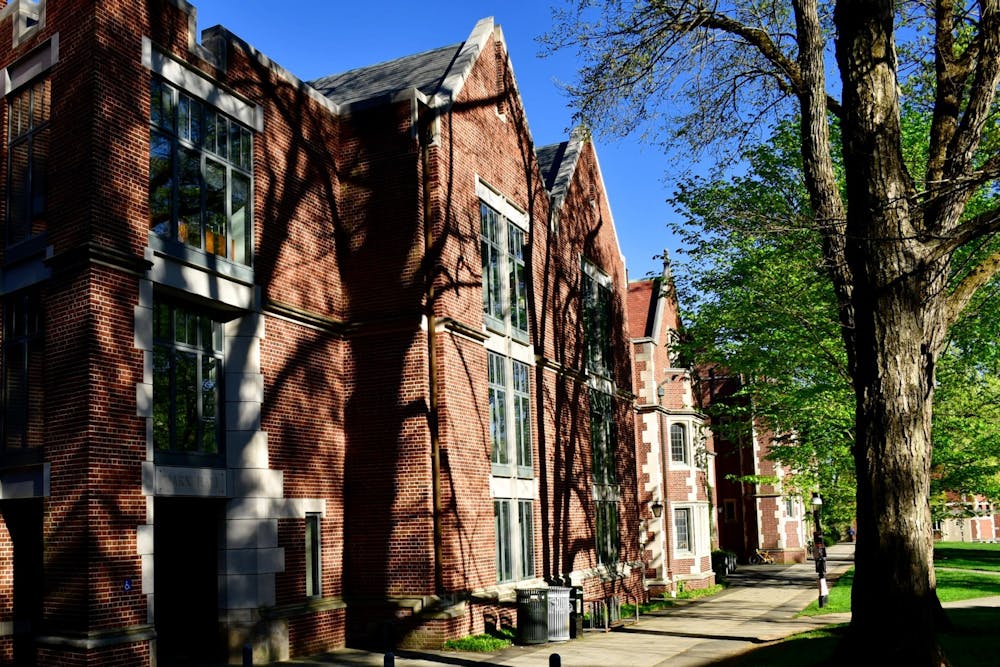The Princeton Peer Health Advisors (PHAs) hosted “The Myth Behind the Freshman 15: Intuitive Eating,” a panel on nutrition, food choice, and wellness earlier this month. The session featured dietitians and psychologists from Undergraduate Health Services (UHS) and Campus Dining.
PHAs Jiyoun Roh ’24, Emely Fernandez ’25, and Chioma Ugwonali ’24 were joined by panelists UHS Clinical Dietician Jesse Chiero, Campus Wellness Dietician Puneet Sethi, UHS Sports Dietician Hector H. Martinez, and UHS psychologist Jessica Chavez. Panelists discussed common eating habits exhibited by students. Martinez, who works with student-athletes, attested to how demanding schedules often push eating habits to the bottom of students’ priorities.
“We’re so overly consumed with our day, and nutrition takes a backseat to that,” Martinez said. “Once we get inside [the dining hall], we’re more reactive to the day [...] we’re much more inclined to grab things that are fast.”
Chiero echoed this sentiment, explaining that because of the “pressure to perform” placed on students, “eating gets pushed to the sidelines.”
He also noted that fad diets, like clean eating, which limits processed foods and can involve cutting out entire food groups, and intermittent fasting, which confines eating to specific hours of the day, can be incredibly harmful to students’ nourishment.
Addressing another diet myth, which discourages late-night eating, Martinez assured participants that “[y]ou can eat after 8 p.m.,” which elicited laughter from the attendees.
“As we make our way into the late evening, that doesn’t mean we cut off, especially if we’re studying late at night. We need that nourishment in our studies,” he explained.
Fernandez posed a follow up question about the “myth of the freshman 15.” Chiero was quick to note that the trope is a misinterpretation and over-generalization of the first-year college experience.
“The age range [of college] is still generally where maybe you’ve hit your primary growth age, to interpret weight status changes as not healthy and normal during that time … is driven by the idea that the weight you were previously is the weight you should be,” Chiero said. “But you’re not supposed to stay at that previous weight.”
Empathy and understanding were a common theme throughout the night, as students reflected on their mutual experiences eating with peers. Michelle Thurber ’26 explained that this insight was her greatest takeaway from the panel.
“The most important thing with eating is recognizing that everyone has different habits, so it’s not really helpful to compare your plate with someone else’s,” she said in an interview with the ‘Prince.’
The panelists proposed intuitive eating as a way for students to keep these values in mind as they nourish their bodies.

“The key to eating intuitively is to have mindfulness, being in the moment and focused on eating,” Sethi shared. “Working in the dining hall, I see everyone on devices, rushing [...] then getting onto the next thing. In order to follow our innate hunger and fullness, we need to be mindful.”
Chiero noted the importance of recognizing when you’re actually hungry, versus when you’re turning to food as emotional support.
“Say you’re anxious, tired, disengaged or feeling depressed, think about coping strategies other than eating,” he said.
“Food has the ability to turn down the volume of that emotion. It has a dopamine effect. If you’re emotionally charged, and your reaction is to go to food, you should think ‘what are my other options that will reorient how we’re feeling emotionally?’” he continued.
The panel also engaged with exercise habits — many students believe they can compensate for poor nutrition with exercise. Chiero debunked this theory, explaining that bodies are dynamic in nature.
“It’s not all calories-in, calories-out. Various things influence nutritional needs and eating behaviors that go beyond compensation through exercise,” he said.
Chavez suggested that students think of exercise not as a means to burn calories, but rather, as one to destress and find joy.
“If you’re moving and you’re smiling, you’re probably doing something right. It’s an easy checkpoint,” he added.
According to Roh, the event was a collaborative effort for the PHAs, who said they wanted to bring information about nutrition and eating to the broader community.
Erik Roll ’24 attended in his capacity as outreach chair of Princeton’s Food Allergy and Celiac Team for University Advocacy and Living (FACTUAL). Roll said he had not been familiar with intuitive eating as a concept, but found it to be impactful in regards to his own eating habits.
“I think living with food allergies, having lived with food allergies my whole life, you are hyper-aware of some of the things that you eat,” he said. “I guess intuitive eating is important […] it definitely helps you keep in mind […] ‘Hey, you can enjoy food without those restrictions.’”
The event was held in Laura-Wooten Hall at 4:30 p.m. on Wednesday, Nov. 9.
Izzy Jacobson is a news staff writer & features contributor for the ‘Prince’. Please direct all corrections requests to corrections[at]dailyprincetonian.com.








